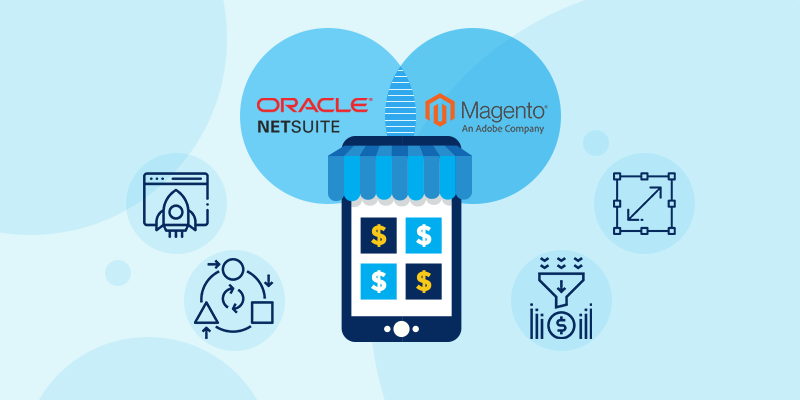Magento NetSuite ERP integration: Top 10 factors you should keep in mind

Imagine you’re running a growing eCommerce business with orders flowing in from your Magento store. Each day brings higher sales volumes, but behind the scenes, your team is bogged down by manual data entry—updating inventory, tracking orders, and managing customer information. Mistakes pile up, stock levels are off, and orders get delayed. This is where Magento NetSuite ERP integration becomes your game-changer.
In this blog, we’ll cover the top 10 factors you need to consider before implementing a Magento NetSuite ERP integration, helping you make an informed decision and achieve seamless eCommerce operations.
1. Real-Time Data Synchronization
Real-time data synchronization is absolutely essential for maintaining accurate information across your Magento store and NetSuite ERP system. Without it, there is a risk of incorrect order reflections, which could result in over-selling, stock problems, and delayed customer responses.
By synchronizing order data, customer details, and inventory levels between Magento and NetSuite in real-time, you eliminate the risk of errors, ensuring smooth operations. For example, if a product goes out of stock on Magento, the integration will update NetSuite instantly, reducing the risk of selling unavailable products.
Why it matters:
- Ensures real-time updates for inventory, pricing, and customer information.
- Reduces manual data entry and human errors.
Pro Tip: Look for solutions that offer API-based data synchronization for faster, more accurate data flow.
2. Scalability and Flexibility
As your business scales, so should your integration. Whether you’re processing 500 or 10,000 orders per month, your Magento NetSuite ERP integration should handle increased traffic and order volume seamlessly. The right integration solution will be flexible enough to support future growth, including expansion into new sales channels or markets.
Considerations:
- Can the integration handle your current order volume and expected growth?
- Does it allow easy customization for changing business processes?
Pro Tip: Choose an integration partner that supports multi-location and multi-currency capabilities for businesses expanding into global markets.
3. Inventory and Order Management
One of the biggest challenges for growing eCommerce businesses is managing inventory and orders efficiently. Without an integrated solution, you’ll spend hours updating inventory data between Magento and NetSuite manually, increasing the risk of errors.
By automating inventory management and order fulfillment, the integration ensures real-time stock updates, reduces out-of-stock situations, and improves customer satisfaction. It also enables automated order processing, from customer purchase to shipment tracking, saving time and resources.
Why it’s crucial:
- Avoids stock discrepancies and overselling
- Automates order processing, speeding up fulfillment times.
4. Automation of Financial Processes
Handling invoicing, payments, and taxes manually can lead to errors and slow down your accounting processes. With Magento NetSuite ERP integration, you can automate financial operations, ensuring accuracy and compliance across systems.
By automating inventory management and order fulfillment, the integration ensures real-time stock updates, reduces out-of-stock situations, and improves customer satisfaction. It also enables automated order processing, from customer purchase to shipment tracking, saving time and resources.
Benefits of financial automation:
- Automatically syncs payment data from Magento to NetSuite, streamlining invoicing.
- Ensures accurate tax calculations for various regions, reducing compliance risks.
For example, a retail business that sells across multiple states can automate tax calculations based on regional tax rates using the integration, ensuring compliance with local regulations.
5. Customization and Extension Support
Your business may have unique workflows, from custom pricing rules to specific product configurations. Customization is key to ensuring your Magento NetSuite ERP integration aligns with these workflows.
The integration should offer flexibility to add extensions, custom fields, and unique workflows to match your specific needs. For instance, a business selling custom-made products may need the ability to configure product options directly from Magento and sync them with NetSuite for production.
What to look for:
- Customizable workflows for pricing, SKUs, and order processing.
- Support for third-party extensions and plugins.
6. Customer Experience and CRM Integration
A seamless customer experience is essential for business success. By integrating NetSuite CRM with Magento, you can ensure that customer data, order history, and communication are synchronized across systems.
This integration allows your customer service teams to access real-time data about order statuses, customer preferences, and interactions, improving the overall customer experience.
Key advantages:
- Provides real-time updates on customer orders and returns.
- Centralizes customer data, helping your teams offer personalized support.
7. Multi-Channel Selling and Integration
Many eCommerce businesses sell across multiple platforms—Amazon, eBay, Magento, and more. Ensuring that all sales data, product details, and inventory levels are consistent across these channels is essential for operational efficiency.
Why it matters:
- Streamlines product management and inventory across multiple platforms.
- Ensures consistent pricing, product details, and stock availability on every sales channel.
A Magento NetSuite ERP integration can help synchronize data from multiple sales channels, ensuring a unified backend system and reducing the workload on your team.
8. Security and Compliance
Data security and regulatory compliance are crucial when integrating Magento with NetSuite. With sensitive customer and payment data being transferred between systems, you need to ensure robust encryption and security protocols are in place.
Compliance with regulations such as GDPR and PCI DSS is also a priority. The integration should provide secure handling of customer data, ensure compliance with global standards, and protect against potential data breaches.
Security considerations:
- Ensure secure data encryption between Magento and NetSuite.
- Compliance with industry regulations like GDPR and PCI DSS.
9. Seamless Shipping and Fulfillment Integration
Shipping and fulfillment are key components of eCommerce success. A Magento NetSuite ERP integration should automate shipping data transfers, ensuring that order details are instantly sent to fulfillment centers, and tracking information is provided to customers.
By streamlining shipping operations, you can reduce delays, minimize errors, and enhance customer satisfaction. For example, shipping labels can be automatically generated based on order details, cutting down on manual entry and processing time.
10. Cost of Implementation and ROI
Before implementing Magento NetSuite ERP integration, it’s essential to evaluate the costs involved, including setup, customization, and ongoing maintenance. However, the return on investment (ROI) from streamlined operations, reduced errors, and improved customer experiences often outweigh the initial investment.
Calculate potential ROI by assessing how much time and money your business will save on manual data entry, inventory management, and customer service.
Factors to consider:
- Initial integration cost vs. long-term savings.
- Improved efficiency and reduced labor costs.
Conclusion: Achieving Growth with Magento NetSuite ERP Integration
Integrating Magento with NetSuite ERP is a game-changer for eCommerce businesses looking to streamline operations, automate workflows, and scale efficiently. By considering these 10 critical factors—from real-time data synchronization to security and ROI—you can ensure a successful integration that drives growth and enhances customer experiences.
Ready to streamline your operations? Contact our team today to schedule a demo and explore how Magento NetSuite ERP integration can revolutionize your business.

Director – ERP Advisory & NetSuite Solutions




